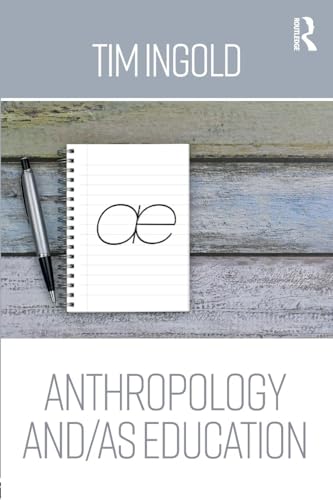Anthropology and/as Education
Tim Ingold
BOOK REVIEW

In a world where boundaries between disciplines blur, Anthropology and/as Education emerges as a powerful testament to the profound interconnections between cultural practices and educational frameworks. Tim Ingold's exploration challenges conventional views, urging readers to reconsider how education is perceived-not merely as a structured curriculum set within four walls, but as a dynamic process informed by the intricate tapestry of human existence itself.
Have you ever pondered the essence of learning? It's not just about rote memorization or textbook regurgitation; it's about the way we engage with the world around us. Ingold's narrative digs deep into this premise, suggesting that our educational experiences are fundamentally entwined with the anthropological understanding of culture, community, and the lived experiences that shape our identities. This isn't just an academic treatise; it's a call to arms for educators, students, and anyone connected by the threads of learning and culture.
The author doesn't simply present facts; he ignites a spark that compels you to think. With a unique blend of theoretical discourse and practical insights, Ingold breaks down complex ideas into digestible revelations. Imagine standing at the intersection of anthropology and education, observing how our social fabric informs our learning processes. The book is a kaleidoscope of theories and case studies, inviting you to see the world through multiple lenses. 💡
Critics and readers alike have praised Ingold's ability to weave these intricate strands together. Many find his arguments both refreshing and provocative. Some assert that his approach serves as a revelation in educational discourse, while others wonder if he challenges existing paradigms a bit too audaciously. Those dissenting voices might argue that some readers could feel overwhelmed by the breadth of philosophical ideas presented. But isn't that the beauty of intellectual engagement? To provoke thought, to stir debate, to inspire transformation?
Ingold's background as an anthropologist lends a rich depth to his discourse. He urges us to consider the implications of seeing education as a cultural practice rather than a mere transaction of knowledge. The book grants insight into how our individual narratives weave together, creating a collective educational experience that is vibrant, colorful, and, at times, tumultuous. It's a reminder that learning is not a solitary undertaking; it's a communal journey shared across generations.
The historical context surrounding the release of Anthropology and/as Education adds another layer to its significance. In an age where education is often discussed in terms of metrics and outcomes, Ingold's perspective is a refreshing reminder of the human element behind the process. He deftly navigates through contemporary issues in education-be it the rise of standardized testing or the blurred lines between formal and informal learning environments-insisting that we must reconsider our approaches and methodologies to genuinely engage with learners.
Opinions on the book vary, creating a tapestry of reactions that reflect its richness. Some readers have lauded it as an essential resource that will redefine future educational frameworks. Others express skepticism regarding its applicability to traditional educational systems, questioning how deeply anthropological insights can be practically integrated. Yet, the very existence of this dialogue exemplifies the book's impact: it pushes boundaries, it challenges norms, and it ignites a passion for rediscovering the roots of education.
So, as you flip through its pages, think about what Anthropology and/as Education truly represents. It's more than just a book; it's a transformative exploration that invites you to reconsider your relationship with learning and culture. Whether you find yourself enamored by its insights or questioning its conclusions, one thing is undeniable: this work leaves an indelible mark. It forces a confrontation with educational paradigms, challenging us to envision a world where learning is not just an academic endeavor but a holistic engagement with life itself.
Do not let the chance to delve into this intellectual masterpiece slip away. Be among those who embrace the call to rethink education, to understand its roots in our cultural narratives. The questions raised, the reflections it provokes-these are not mere academic exercises, but vital steps toward a deeper comprehension of our shared human experience. You owe it to yourself to explore the intricate dance of anthropology and education, to witness how these realms intertwine and shape our existence. 🌍✨️
📖 Anthropology and/as Education
✍ by Tim Ingold
🧾 106 pages
2017
#anthropology #andas #education #ingold #TimIngold